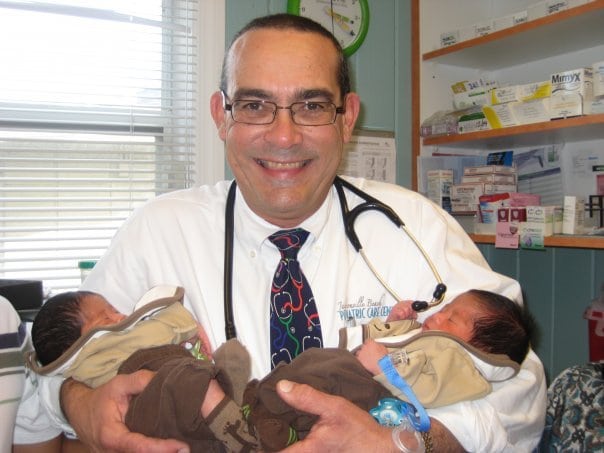
Brought to you by 24/7 Pediatric Care Centers
What an exciting time! You and your newborn are headed home from the hospital. It’s thrilling and also a little scary to take charge of this new little one’s schedule and all that’s involved.
Beyond the routine you establish for feeding, sleeping, changing and cuddle time, you’ll also need to establish the routine for visits to your baby’s pediatrician. Although you probably were briefed on pediatrician visits before the baby’s birth and during your stay at the hospital, it can all seem a little confusing. You’ll need to work with your pediatrician’s office to make appointments at the proper intervals.
We asked Dr. Benitez and his staff from the 24/7 Pediatric Care Centers in Jacksonville, Jax Beach, and Orange Park about the program of care they recommend. Actually, pediatricians from around the country are led by American Academy of Pediatrics guidelines on the newborn’s ideal schedule of exams and immunizations during the first year, and Dr. Benitez’s team follows those guidelines.
You’ll be amazed at how quickly your newborn’s systems will be developing during this time. The formal schedule of visits for year 1 was created so that your pediatrician can make sure everything is on track, or can intervene if something is out of the ordinary.
Here’s Dr. Benitez’s recommended schedule and what to expect during each visit.
For the first month, you should plan to visit your chosen pediatrician when the baby is 3 to 5 days old. During that visit, the pediatrician and staff will perform a typical newborn checkup: assessing weight, eating and sleeping habits, the condition of the umbilical cord, bowel, and urine habits, and doing a head-to-toe physical exam.
At two weeks old, your baby will again undergo the newborn checkup – measurement of weight, length and head circumference; assessment of general behavior; and a head-to-toe physical exam. The schedule for the Hepatitis B vaccine will be based on whether the baby received the first dose at the hospital.
The two-month visit brings a repeat of the newborn checkup as described above, and a round of immunizations: rotavirus (RV); diphtheria/tetanus/pertussis (DTaP); influenza type B (Hib); pneumococcal vaccine (PCV); inactivated poliovirus (IPV). Some of the vaccines can be combined to reduce the number of needle sticks. (Sorry, baby!)
At four months, you and your baby will be back at the pediatrician’s office with the same exams as above, as well as blood tests. The second doses of RV, DTaP, Hib, PCV and IPV will be given.
At six months, the same exams are done, and more immunizations are given: RV, third doses of DTaP, PCV and possibly Hib. The third doses of IPV may be given any time between 6 and 18 months.
At nine months, the exams we’ve described above are performed again. What’s new: developmental screening for performance of certain skills, growth and behavior; and an oral health check.
By 12 months, you and your baby will be pros at navigating the pediatrician’s office. The baby will have the same exams as previously and blood screening tests. The immunizations go on: final hepatitis B; third or fourth dose of Hib now or by 15 months; fourth dose of PCV now or by 15 months; third dose of IPV; first dose of measles, mumps and rubella vaccine (MMR) now or by 15 months; varicella (chicken pox) now or by 15 months; dose of hepatitis A vaccine now or by 23 months.
That’s it! As you can see, the first year is the busiest in terms of routine pediatric care, so once you’ve passed this milestone, it’ll be easy sailing from here on. Of course, every pediatrics practice is different, so don’t panic if your doctor varies somewhat from this description.
More importantly, don’t be afraid to ask questions – lots of questions – during the first year. All of the staff at your doctor’s office will be glad to help out with practical answers. You’ll find you have questions about everything from food to fingernails, bedtime to baths, play to pets, and much, much more.
Most of all, relax and have fun with your new baby. The first year, let’s face it, is exhausting but is so worth it! The second and third years will pose a lot more new adventures for your family, so stay strong!
Thank you to 24/7 Pediatric Care Centers for sponsoring this post.
















